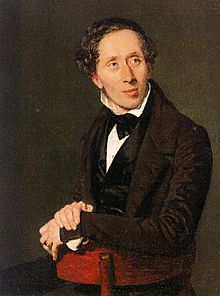The Sweethearts; or, The Top and the Ball facts for kids
Quick facts for kids "The Sweethearts;or, The Top and the Ball" |
|
|---|---|

Andersen in 1836
|
|
| Author | Hans Christian Andersen |
| Original title | "Kjærestefolkene [Toppen og bolden]" |
| Country | Denmark |
| Language | Danish |
| Genre(s) | Literary fairy tale |
| Published in | New Fairy Tales. First Volume. First Collection (Nye Eventyr. Første Bind. Første Samling) |
| Publication type | Fairy tale collection |
| Publisher | C.A. Reitzel |
| Media type | |
| Publication date | 11 November 1843 |
| Preceded by | "The Nightingale" |
| Followed by | "The Ugly Duckling" |
"The Sweethearts; or, The Top and the Ball" (in Danish: Kjærestefolkene [Toppen og bolden]) is a famous fairy tale by Hans Christian Andersen. It tells the story of a wooden spinning top who loves a leather ball very much. However, the ball does not love him back. This kind of one-sided love is often called "unrequited love."
Some people believe Andersen wrote this story because of his own feelings. He once liked a woman named Riborg Voight. She said no when he asked her to marry him in 1830. "The Sweethearts" was first published in November 1843. It appeared in a book called New Fairy Tales. First Volume. First Collection. This collection of stories was very popular in Denmark.
Story Summary
In a drawer full of toys, a shiny wooden top falls in love with a leather ball. The top tries to show his feelings for the ball. But the ball does not care for him. She thinks she is too good for him. The ball believes she deserves a much fancier toy.
One day, the ball is taken outside to play. Someone throws her high into the air. She flies up and then disappears. The top thinks she has gone to live with a bird. He imagines she has become the wife of a swallow. He believes the swallow lives in a nearby tree. Since he cannot be with her, the top loves her even more.
Many years pass by. One day, the top gets a new look. He is polished and covered with gold. He is spun around and then accidentally jumps into the dustbin. Among the trash, he sees the ball. She looks old and worn out. She has been damaged by rain and weather. The ball does not recognize the top as her old admirer. She tells him she spent five years stuck in a roof gutter. She was soaked with rain before falling into the dustbin.
Suddenly, the maid comes and finds the top. She takes him back into the house. The top no longer feels the same way about the ball. He realizes that love can disappear. Especially when the person you loved has been in a gutter for five years. And you don't even know them when you meet them again.
Inspiration for the Tale
"The Sweethearts" is a completely original story by Andersen. It is not based on any old folk tales. The idea for the story likely came from Andersen's own life. It connects to his feelings for Riborg Voight. She was the daughter of a Danish merchant. She turned down his marriage proposal in 1830.
After she said no, Andersen felt very sad. He even doubted his own writing skills. He decided to travel away from Denmark. He went on his first trip abroad to Germany. Andersen met Riborg Voight again in 1843. This was while he was on holiday in Funen. He saw that she had changed a lot over the years.

